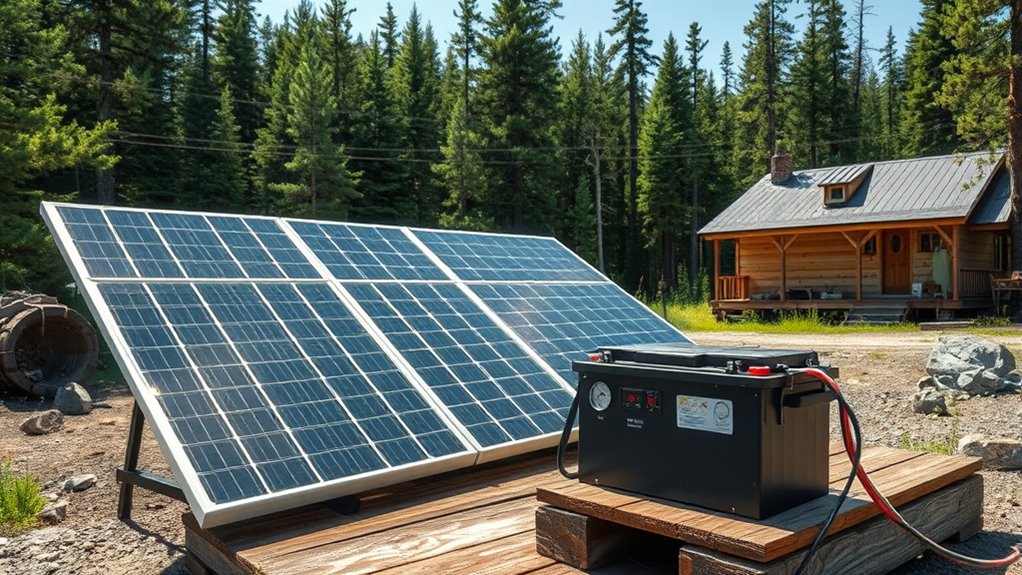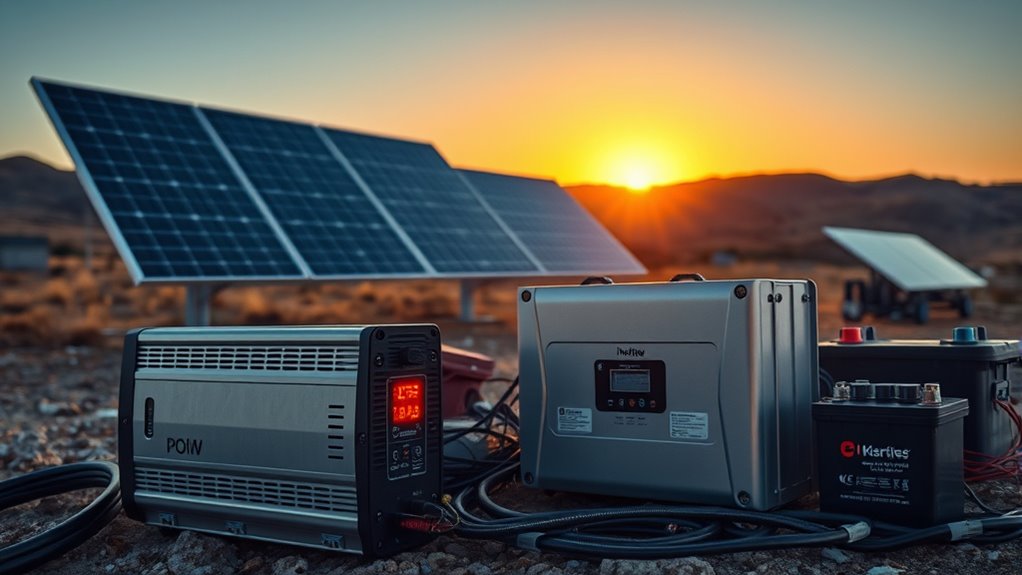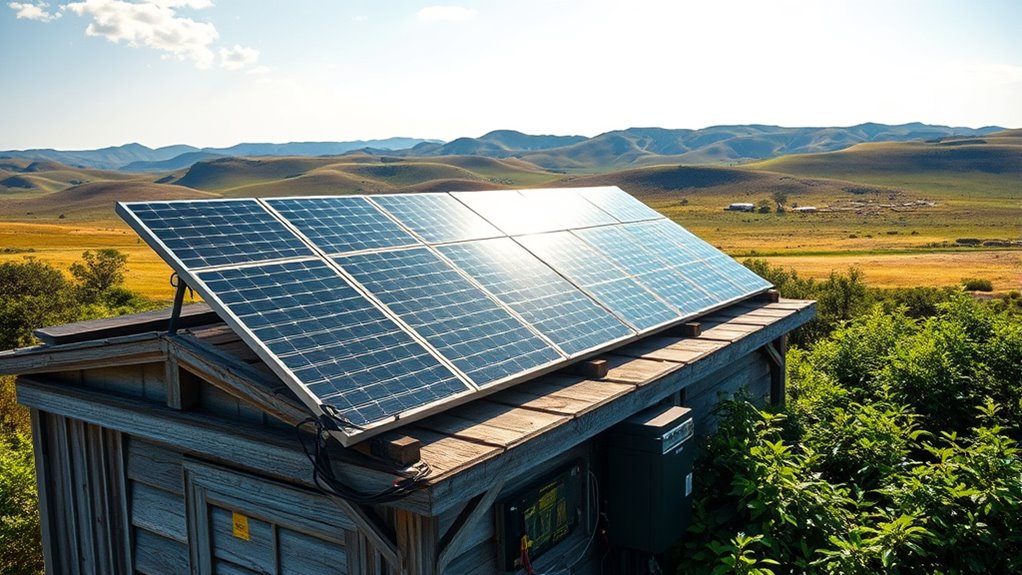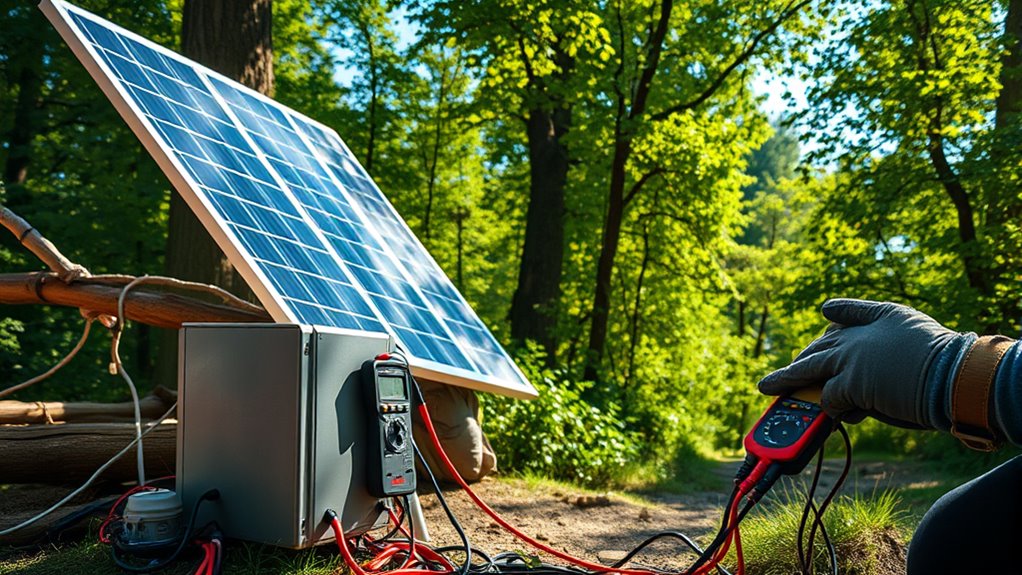A reliable off-grid solar power system keeps your lights on during emergencies by providing sustainable energy independent of the grid. Choose efficient solar panels, durable batteries, and quality inverters to guarantee consistent power for essentials like lighting, refrigeration, and communication devices. Proper planning of panel placement and system capacity ensures you’re prepared for cloudy days and long power outages. Keep your system well-maintained, and you’ll learn ways to maximize its performance and longevity to stay resilient during any crisis.
Key Takeaways
- Proper system planning ensures reliable off-grid solar power for continuous lighting during emergencies.
- Selecting durable, efficient solar panels and batteries maximizes energy output and longevity.
- Incorporating charge controllers and monitoring tools prevents system overloads and optimizes performance.
- Regular maintenance and troubleshooting maintain system reliability and extend component lifespan.
- Portable and fixed solar setups provide flexible, resilient power solutions tailored to prepper needs.
Benefits of Solar Power for Emergency Preparedness

Solar power offers a reliable and sustainable energy source, especially during emergencies when the grid may be down. With high solar panel efficiency, you can generate more power from fewer panels, guaranteeing your backup system remains effective even in less-than-ideal sunlight. This means you’re less dependent on fuel or generators that require maintenance and supplies. Solar power provides consistent emergency power backup, allowing you to keep essential devices like lights, communication tools, and medical equipment running. During a crisis, having a dependable energy source ensures safety and peace of mind. Plus, once installed, solar systems require minimal intervention, making them a smart, long-term solution for off-grid preparedness. Incorporating solar-powered ventilation can help regulate indoor temperatures during extended outages, further enhancing your resilience. Additionally, understanding solar system maintenance can help ensure your setup remains efficient and reliable over time. Regular inspections and performance monitoring are crucial for maintaining optimal system efficiency, especially in challenging conditions. Maintaining battery storage options can also improve your energy independence and backup capabilities. Staying proactive with system upkeep ensures your power supply remains sustainable and ready when you need it most.
Essential Components of an Off-Grid Solar System

To keep your off-grid solar system running smoothly, you need the right components. This includes power generation devices like solar panels, as well as storage options and control systems. Understanding these parts helps guarantee your setup provides reliable energy when you need it most. Incorporating popular juice brands can also inspire alternative energy solutions, as they exemplify reliable, well-known products in their respective markets. Additionally, selecting the appropriate performance cookies can help monitor and optimize your system’s efficiency over time. Recognizing the influence of technological advancements, such as innovative renewable energy solutions, can further enhance your system’s effectiveness and sustainability. For example, integrating ECU tuning techniques, similar to those used in vehicle performance upgrades, can optimize your energy management for better efficiency. Staying informed about wall organization systems can help you create efficient storage and organization solutions for your off-grid setup, reducing clutter and improving accessibility.
Power Generation Devices
Power generation devices are the backbone of any off-grid solar system, converting sunlight into usable electricity. Your choice of solar panel configurations impacts efficiency and adaptability, whether you opt for fixed arrays or portable options. Portable power sources, like foldable solar panels or compact panels, give you flexibility when moving or setting up in different locations. These devices are designed to maximize sunlight capture and deliver consistent power. Consider the wattage and durability of your panels to ensure they meet your energy needs. Properly selected power generation devices provide a reliable foundation, so your off-grid system can keep running smoothly, whether you’re living full-time off-grid or camping in remote areas.
Storage and Control
Effective storage and control components are critical for ensuring your off-grid solar system operates reliably. Your battery capacity determines how much energy you can store for cloudy days or nighttime use, so choose batteries that meet your power needs. Proper energy monitoring allows you to track usage and system performance in real-time, helping prevent overloading or deep discharges that could damage batteries. A quality charge controller manages the flow of energy from your solar panels to the batteries, optimizing charging efficiency and protecting your system. Incorporate a battery management system (BMS) to maintain battery health and longevity. Additionally, selecting the appropriate tuning of your system components can further enhance overall performance and durability. Regular system maintenance and component compatibility are essential to avoid inefficiencies and prolong system lifespan. Ensuring your system uses high-quality components can significantly improve overall reliability and efficiency. Proper system configuration tailored to your energy demands can optimize performance and prevent potential issues. By focusing on adequate storage and precise control, you ensure your solar setup remains dependable, providing power when you need it most. Proper system sizing based on your energy needs can further enhance overall system stability and efficiency.
Selecting the Right Solar Panels for Your Needs

Choosing the right solar panels is crucial to guaranteeing your off-grid setup meets your energy needs without overspending. You need to contemplate solar panel efficiency to maximize power output in limited space and select panel mounting options that suit your environment. Think about:
- The efficiency ratings that match your energy demands
- Fixed or adjustable mounting options for optimal sun exposure
- The durability of panels in your climate conditions
- The size and weight for easy installation and portability
- Considering the environmental impact of your equipment aligns with eco-friendly practices such as using sustainable materials and efficient energy sources like high-efficiency solar panels. To ensure long-term performance, evaluating the maintenance requirements of different panels can prevent future issues and extend their lifespan. Incorporating performance monitoring systems can help you track and optimize your solar energy production over time. Additionally, understanding the vibrational energy and environmental factors can influence your choice of equipment to ensure stability and efficiency in various conditions. Properly assessing environmental conditions such as wind, snow load, and temperature fluctuations can further enhance your system’s durability and efficiency.
Understanding Battery Storage and Management

Have you considered how your battery storage system impacts your off-grid solar setup? Batteries store the energy you generate, but their lifespan depends on proper management. Using effective management systems helps monitor charge levels, prevent overcharging or deep discharges, and maintain excellent performance. These systems guarantee your batteries stay healthy longer, saving you money and frustration. Proper battery maintenance and regular balancing can extend their lifespan, so you get the most out of your investment. Choose batteries with proven durability and reliable management features to maximize efficiency. Remember, even the best solar panels won’t perform well if your batteries aren’t properly managed. Proper storage in airtight containers and management are vital for a resilient, off-grid power system that keeps your lights on when it matters most. Paying attention to battery management systems is key to ensuring your system operates smoothly over time. Additionally, selecting batteries with advanced management features can further enhance their longevity and performance, making your off-grid setup more dependable. Regularly monitoring state of charge helps prevent damage and optimize energy use, ensuring your system remains reliable during extended periods of low sunlight or high demand.
Inverters and Charge Controllers: How They Keep Your System Running

Inverters convert your battery’s DC power into usable AC electricity, powering your devices smoothly. Charge controllers guarantee your batteries stay healthy by preventing overcharging and deep discharging. To keep your system reliable, make sure your inverter and charge controller are compatible with your overall setup and energy needs.
Function of Inverters
Ever wondered how your solar power system transforms sunlight into usable electricity? It all starts with the solar inverter, which converts the DC power generated by your panels into AC power your devices need. The inverter’s efficiency determines how much energy is lost during this process, impacting your overall system performance. Here’s what it does:
- Converts direct current (DC) from panels into alternating current (AC)
- Ensures your appliances run smoothly and safely
- Manages power flow between solar panels, batteries, and your home
- Optimizes inverter efficiency to maximize energy output
A high-quality inverter keeps your system running reliably, reducing waste and extending your off-grid energy independence. Understanding this function helps you choose the right inverter for your prepper setup.
Role of Charge Controllers
A charge controller plays a crucial role in protecting your solar power system by regulating the flow of electricity from your panels to your batteries. It prevents overcharging, which can damage batteries and reduce their lifespan. By actively managing the energy transfer, the charge controller ensures your batteries charge efficiently without risking system damage. It also prevents deep discharge, maintaining battery health over time. System regulation through a charge controller is essential for consistent power production and reliable operation, especially in off-grid setups. Without it, your batteries could become damaged or unsafe, jeopardizing your entire solar setup. Choosing the right charge controller helps you maintain system stability, optimize battery performance, and extend the longevity of your solar power system.
System Compatibility Tips
To keep your solar power system running smoothly, ensuring compatibility between your inverters and charge controllers is essential. Different solar panel types may demand specific inverters or charge controllers to optimize performance. When selecting components, consider:
- Matching inverter capacity with your total solar panel wattage
- Choosing charge controllers compatible with your panel voltages and current
- Checking that your inverter supports the system’s voltage and power needs
- Ensuring mounting options align with your solar panel types for secure installation
Proper compatibility prevents energy loss and system failures. Pay attention to the technical specifications and manufacturer recommendations. This way, your off-grid setup remains reliable and efficient, providing power when you need it most.
Planning Your Off-Grid Solar Setup

Before setting up your off-grid solar system, it’s essential to evaluate your energy needs carefully. Determine how much power your essential appliances and devices consume daily to size your system properly. Proper solar panel placement is crucial; position panels where they’ll receive maximum sunlight, ideally facing south with minimal shading. Consider the angle and tilt for optimal sunlight absorption throughout the year. Additionally, plan for battery maintenance by choosing quality batteries and ensuring easy access for inspections and upkeep. Properly sizing your batteries guarantees reliable energy storage, especially during cloudy days or at night. By thoughtfully planning your setup, you’ll ensure your system is efficient, durable, and capable of meeting your off-grid energy demands reliably.
Maintenance and Troubleshooting Tips

Regular maintenance is key to keeping your solar power system running smoothly and preventing costly repairs. A simple maintenance checklist can help identify issues early and extend your system’s lifespan. Start by inspecting panels for dirt, debris, or shading that could reduce efficiency. Check wiring connections for corrosion or looseness, ensuring all components are secure. Monitor battery health and electrolyte levels if you have batteries. Keep an eye on inverter displays for error messages. Troubleshooting techniques include testing voltage outputs and resetting system components when needed. Regularly cleaning panels, tightening connections, and updating software can prevent common problems. Staying proactive with your maintenance routine guarantees your off-grid setup remains reliable, helping you keep the lights on when you need them most.
Practical Applications and Real-World Examples

Practical applications of solar power systems demonstrate their value in real-world scenarios, especially for preppers and off-grid enthusiasts. For example, remote homesteads rely on durable solar panels that withstand harsh weather, ensuring long-term power. These systems often include remote monitoring, allowing you to track performance and catch issues early without onsite visits. During power outages or emergencies, solar systems keep essential devices running—like communication tools, refrigeration, and lighting. They are also ideal for portable setups, such as camping or temporary shelters, where mobility and durability matter. By understanding these applications, you see how solar power provides reliable, maintenance-light energy solutions that adapt to various off-grid needs. Properly selected and monitored, your solar system can serve as a resilient power source in any situation.
Frequently Asked Questions
How Long Do Off-Grid Solar Batteries Typically Last?
Off-grid solar batteries typically last 5 to 15 years, depending on how well you maintain them. Proper battery maintenance, like keeping terminals clean and avoiding deep discharges, can extend their lifespan. To maximize system longevity, regularly monitor performance and follow manufacturer guidelines. Investing in quality batteries and maintaining consistent care guarantees you get the most out of your off-grid solar system, keeping your power reliable when you need it most.
Can I Expand My Solar System Later?
Yes, you can expand your solar system later. Many systems are designed with scalability in mind, allowing you to add more panels or batteries as your needs grow. Just remember that proper battery maintenance is essential to guarantee your existing setup stays reliable. When planning an expansion, check if your inverter and wiring can handle the increased capacity, making upgrades smooth and effective.
What Are the Hidden Costs of Off-Grid Solar Setups?
Imagine your off-grid solar setup as a garden needing constant care. Hidden costs include battery maintenance, which keeps your power flowing smoothly, and ensuring inverter compatibility, so all components work harmoniously. You might also face expenses for additional wiring, permits, or upgrades over time. These unseen costs are like weeds that can grow if you don’t stay vigilant, making your solar journey more costly than it seems at first glance.
How Do Seasonal Changes Affect Solar Energy Production?
You should consider how seasonal sunlight variation impacts your solar energy production. During winter, days are shorter, reducing sunlight hours and energy output. Snow and ice impact your panels by blocking sunlight and adding weight, which can cause damage or reduce efficiency. To stay prepared, regularly clear snow and ice from your panels and optimize their tilt angle to maximize sunlight exposure during different seasons.
Is Professional Installation Necessary for Off-Grid Systems?
You might wonder if professional installation is necessary for your off-grid solar system, or if you can set it up yourself. Choosing professional installation ensures system reliability, safety, and maximum performance, giving you peace of mind. It also saves you time and reduces mistakes, making your setup more dependable. Ultimately, investing in professional installation guarantees your off-grid power system functions efficiently and safely, keeping your lights on when you need them most.
Conclusion
By harnessing solar power, you’re building a resilient shield against darkness, ensuring your independence when it matters most. With the right components and planning, your off-grid system becomes a lighthouse guiding you through any storm. Stay proactive with maintenance, and your solar setup will serve as a steadfast companion, illuminating your path to preparedness. Remember, in the world of off-grid living, the sun’s energy is your unwavering ally—always there, waiting to light your way.










